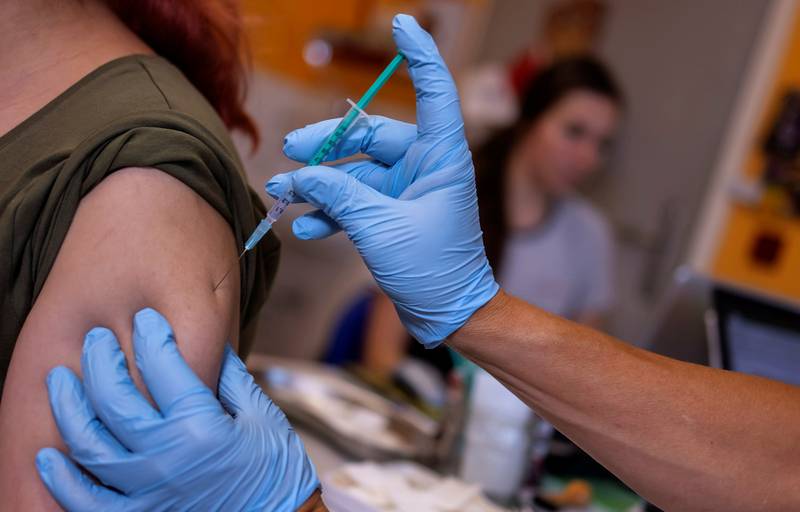Germany reports new daily high for coronavirus cases

Germany’s national disease control centre reported a record high number of new coronavirus cases on Wednesday as one of the country’s top virologists said that another lockdown would be needed if vaccinations do not accelerate quickly.
Chancellor Angela Merkel said that action needs to be taken swiftly.
“In Germany, I must say unfortunately that our vaccination rate isn’t high enough to prevent the fast spread of the virus,” she said.
Germany’s national disease control centre reported a record high number of new coronavirus cases on Wednesday as one of the country’s top virologists said that another lockdown would be needed if vaccinations do not accelerate quickly.
Chancellor Angela Merkel said that action needs to be taken swiftly.
“In Germany, I must say unfortunately that our vaccination rate isn’t high enough to prevent the fast spread of the virus,” she said.
The 39,676 cases registered by the Robert Koch Institute surpassed the previous daily record of 37,120 new infections reported on Friday.
The institute said Germany’s infection rate had risen to 232.1 cases per 100,000 residents over the past seven days.
“We have a real emergency situation right now,” Christian Drosten, head of virology at Berlin’s Charite Hospital, said regarding the situation at many hospital intensive care units in the country.
“We have to do something right now.”
Government officials have repeatedly said they do not intend to impose lockdowns and have instead appealed to residents to be vaccinated.
Germany currently has a caretaker national government following a September election. The parties that are expected to form the next government plan to introduce legislation this week that would allow a declaration of an “epidemic situation of national scope”, instituted in March 2020, to expire at the end of the month and provide a new legal framework for instituting coronavirus measures.
The country has a patchwork of regional rules. Most places restrict access to indoor facilities and events to people who have been vaccinated against the virus, have recovered from Covid-19 or recently received negative test results — with the latter category now excluded in some areas. However, the rules are often laxly enforced.
Ms Merkel pushed for a meeting between the federal government and Germany’s 16 state governors, who are primarily responsible for imposing and lifting restrictions “as quickly as possible” to ensure “harmonious” measures across the country — one of which includes stepping up booster shots.
“The coronavirus pays no regard to whether we have a caretaker government, whether we have coalition negotiations — we need an effort by the whole state,” she said.
Several hospitals have said in recent days that they are again working at their limits and have ICUs so full of Covid-19 patients that they cannot admit new patients.
Berlin’s Charite said on Tuesday it had to cancel planned surgeries due to the number of staff members caring for people with Covid-19. Authorities have said most of the latest patients are unvaccinated.
About 67 per cent of Germany’s population of 83 million is fully vaccinated, official figures show.
Unlike in some other European countries, the government has balked at making vaccines mandatory for any professional group.
Ms Merkel noted that health officials have said a vaccination rate below 75 per cent means “exponential growth with too much occupancy of intensive care beds".
“We probably need to control infection activity again through contact measures — not probably, but certainly,” Mr Drosten said.
“We’re in a bad situation: we have 15 million people who could have been vaccinated and should have been vaccinated,” he said.
He added that at least another 100,000 people could die of Covid-19 if vaccinations do not pick up quickly.
Since the start of the pandemic, 96,963 deaths related to Covid-19 have been reported in Germany.
The country’s standing committee on vaccinations published a new recommendation on Wednesday advising all people under age 30 receive only the Pfizer-BioNTech vaccine.
The committee said the recommendation was based on recent analyses showing that a rare side effect — heart and chest inflammation — was observed more frequently in under-30 recipients of the vaccine made by Moderna than those who received the Pfizer-BioNTech shot.
The side effect appears to be rare and in most cases people recover without any problems.
